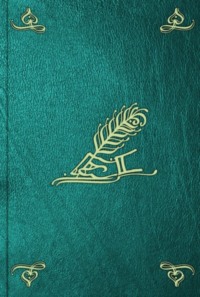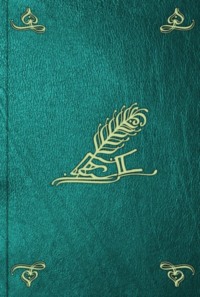 полная версия
полная версияThe Voyage of the Beagle
St. Helena, situated so remote from any continent, in the midst of a great ocean, and possessing a unique Flora, excites our curiosity. The eight land-shells, though now extinct, and one living Succinea, are peculiar species found nowhere else. Mr. Cuming, however, informs me that an English Helix is common here, its eggs no doubt having been imported in some of the many introduced plants. Mr. Cuming collected on the coast sixteen species of sea-shells, of which seven, as far as he knows, are confined to this island. Birds and insects, 179 as might have been expected, are very few in number; indeed I believe all the birds have been introduced within late years. Partridges and pheasants are tolerably abundant; the island is much too English not to be subject to strict game-laws. I was told of a more unjust sacrifice to such ordinances than I ever heard of even in England. The poor people formerly used to burn a plant, which grows on the coast-rocks, and export the soda from its ashes; but a peremptory order came out prohibiting this practice, and giving as a reason that the partridges would have nowhere to build.
In my walks I passed more than once over the grassy plain bounded by deep valleys, on which Longwood stands. Viewed from a short distance, it appears like a respectable gentleman's country-seat. In front there are a few cultivated fields, and beyond them the smooth hill of coloured rocks called the Flagstaff, and the rugged square black mass of the Barn. On the whole the view was rather bleak and uninteresting. The only inconvenience I suffered during my walks was from the impetuous winds. One day I noticed a curious circumstance; standing on the edge of a plain, terminated by a great cliff of about a thousand feet in depth, I saw at the distance of a few yards right to windward, some tern, struggling against a very strong breeze, whilst, where I stood, the air was quite calm. Approaching close to the brink, where the current seemed to be deflected upwards from the face of the cliff, I stretched out my arm, and immediately felt the full force of the wind: an invisible barrier, two yards in width, separated perfectly calm air from a strong blast.
I so much enjoyed my rambles among the rocks and mountains of St. Helena, that I felt almost sorry on the morning of the 14th to descend to the town. Before noon I was on board, and the Beagle made sail.
On the 19th of July we reached Ascension. Those who have beheld a volcanic island, situated under an arid climate, will at once be able to picture to themselves the appearance of Ascension. They will imagine smooth conical hills of a bright red colour, with their summits generally truncated, rising separately out of a level surface of black rugged lava. A principal mound in the centre of the island, seems the father of the lesser cones. It is called Green Hill: its name being taken from the faintest tinge of that colour, which at this time of the year is barely perceptible from the anchorage. To complete the desolate scene, the black rocks on the coast are lashed by a wild and turbulent sea.
The settlement is near the beach; it consists of several houses and barracks placed irregularly, but well built of white freestone. The only inhabitants are marines, and some negroes liberated from slave-ships, who are paid and victualled by government. There is not a private person on the island. Many of the marines appeared well contented with their situation; they think it better to serve their one-and-twenty years on shore, let it be what it may, than in a ship; in this choice, if I were a marine, I should most heartily agree.
The next morning I ascended Green Hill, 2840 feet high, and thence walked across the island to the windward point. A good cart-road leads from the coast-settlement to the houses, gardens, and fields, placed near the summit of the central mountain. On the roadside there are milestones, and likewise cisterns, where each thirsty passer-by can drink some good water. Similar care is displayed in each part of the establishment, and especially in the management of the springs, so that a single drop of water may not be lost: indeed the whole island may be compared to a huge ship kept in first-rate order. I could not help, when admiring the active industry, which had created such effects out of such means, at the same time regretting that it had been wasted on so poor and trifling an end. M. Lesson has remarked with justice, that the English nation would have thought of making the island of Ascension a productive spot, any other people would have held it as a mere fortress in the ocean.
Near this coast nothing grows; further inland, an occasional green castor-oil plant, and a few grasshoppers, true friends of the desert, may be met with. Some grass is scattered over the surface of the central elevated region, and the whole much resembles the worse parts of the Welsh mountains. But scanty as the pasture appears, about six hundred sheep, many goats, a few cows and horses, all thrive well on it. Of native animals, land-crabs and rats swarm in numbers. Whether the rat is really indigenous, may well be doubted; there are two varieties as described by Mr. Waterhouse; one is of a black colour, with fine glossy fur, and lives on the grassy summit, the other is brown-coloured and less glossy, with longer hairs, and lives near the settlement on the coast. Both these varieties are one-third smaller than the common black rat (M. rattus); and they differ from it both in the colour and character of their fur, but in no other essential respect. I can hardly doubt that these rats (like the common mouse, which has also run wild) have been imported, and, as at the Galapagos, have varied from the effect of the new conditions to which they have been exposed: hence the variety on the summit of the island differs from that on the coast. Of native birds there are none; but the guinea-fowl, imported from the Cape de Verd Islands, is abundant, and the common fowl has likewise run wild. Some cats, which were originally turned out to destroy the rats and mice, have increased, so as to become a great plague. The island is entirely without trees, in which, and in every other respect, it is very far inferior to St. Helena.
One of my excursions took me towards the S. W. extremity of the island. The day was clear and hot, and I saw the island, not smiling with beauty, but staring with naked hideousness. The lava streams are covered with hummocks, and are rugged to a degree which, geologically speaking, is not of easy explanation. The intervening spaces are concealed with layers of pumice, ashes and volcanic tuff. Whilst passing this end of the island at sea, I could not imagine what the white patches were with which the whole plain was mottled; I now found that they were seafowl, sleeping in such full confidence, that even in midday a man could walk up and seize hold of them. These birds were the only living creatures I saw during the whole day. On the beach a great surf, although the breeze was light, came tumbling over the broken lava rocks.
The geology of this island is in many respects interesting. In several places I noticed volcanic bombs, that is, masses of lava which have been shot through the air whilst fluid, and have consequently assumed a spherical or pear-shape. Not only their external form, but, in several cases, their internal structure shows in a very curious manner that they have revolved in their aerial course. The internal structure of one of these bombs, when broken, is represented very accurately in the woodcut. The central part is coarsely cellular, the cells decreasing in size towards the exterior; where there is a shell-like case about the third of an inch in thickness, of compact stone, which again is overlaid by the outside crust of finely cellular lava. I think there can be little doubt, first that the external crust cooled rapidly in the state in which we now see it; secondly, that the still fluid lava within, was packed by the centrifugal force, generated by the revolving of the bomb, against the external cooled crust, and so produced the solid shell of stone; and lastly, that the centrifugal force, by relieving the pressure in the more central parts of the bomb, allowed the heated vapours to expand their cells, thus forming the coarse cellular mass of the centre.
A hill, formed of the older series of volcanic rocks, and which has been incorrectly considered as the crater of a volcano, is remarkable from its broad, slightly hollowed, and circular summit having been filled up with many successive layers of ashes and fine scoriae. These saucer-shaped layers crop out on the margin, forming perfect rings of many different colours, giving to the summit a most fantastic appearance; one of these rings is white and broad, and resembles a course round which horses have been exercised; hence the hill has been called the Devil's Riding School. I brought away specimens of one of the tufaceous layers of a pinkish colour and it is a most extraordinary fact, that Professor Ehrenberg 180 finds it almost wholly composed of matter which has been organized: he detects in it some siliceous-shielded fresh-water infusoria, and no less than twenty-five different kinds of the siliceous tissue of plants, chiefly of grasses. From the absence of all carbonaceous matter, Professor Ehrenberg believes that these organic bodies have passed through the volcanic fire, and have been erupted in the state in which we now see them. The appearance of the layers induced me to believe that they had been deposited under water, though from the extreme dryness of the climate I was forced to imagine, that torrents of rain had probably fallen during some great eruption, and that thus a temporary lake had been formed into which the ashes fell. But it may now be suspected that the lake was not a temporary one. Anyhow, we may feel sure, that at some former epoch the climate and productions of Ascension were very different from what they now are. Where on the face of the earth can we find a spot, on which close investigation will not discover signs of that endless cycle of change, to which this earth has been, is, and will be subjected?
On leaving Ascension, we sailed for Bahia, on the coast of Brazil, in order to complete the chronometrical measurement of the world. We arrived there on August 1st, and stayed four days, during which I took several long walks. I was glad to find my enjoyment in tropical scenery had not decreased from the want of novelty, even in the slightest degree. The elements of the scenery are so simple, that they are worth mentioning, as a proof on what trifling circumstances exquisite natural beauty depends.
The country may be described as a level plain of about three hundred feet in elevation, which in all parts has been worn into flat-bottomed valleys. This structure is remarkable in a granitic land, but is nearly universal in all those softer formations of which plains are usually composed. The whole surface is covered by various kinds of stately trees, interspersed with patches of cultivated ground, out of which houses, convents, and chapels arise. It must be remembered that within the tropics, the wild luxuriance of nature is not lost even in the vicinity of large cities: for the natural vegetation of the hedges and hill-sides overpowers in picturesque effect the artificial labour of man. Hence, there are only a few spots where the bright red soil affords a strong contrast with the universal clothing of green. From the edges of the plain there are distant views either of the ocean, or of the great Bay with its low-wooded shores, and on which numerous boats and canoes show their white sails. Excepting from these points, the scene is extremely limited; following the level pathways, on each hand, only glimpses into the wooded valleys below can be obtained. The houses I may add, and especially the sacred edifices, are built in a peculiar and rather fantastic style of architecture. They are all whitewashed; so that when illumined by the brilliant sun of midday, and as seen against the pale blue sky of the horizon, they stand out more like shadows than real buildings.
Such are the elements of the scenery, but it is a hopeless attempt to paint the general effect. Learned naturalists describe these scenes of the tropics by naming a multitude of objects, and mentioning some characteristic feature of each. To a learned traveller this possibly may communicate some definite ideas: but who else from seeing a plant in an herbarium can imagine its appearance when growing in its native soil? Who from seeing choice plants in a hothouse, can magnify some into the dimensions of forest trees, and crowd others into an entangled jungle? Who when examining in the cabinet of the entomologist the gay exotic butterflies, and singular cicadas, will associate with these lifeless objects, the ceaseless harsh music of the latter, and the lazy flight of the former, – the sure accompaniments of the still, glowing noon-day of the tropics? It is when the sun has attained its greatest height, that such scenes should be viewed: then the dense splendid foliage of the mango hides the ground with its darkest shade, whilst the upper branches are rendered from the profusion of light of the most brilliant green. In the temperate zones the case is different – the vegetation there is not so dark or so rich, and hence the rays of the declining sun, tinged of a red, purple, or bright yellow color, add most to the beauties of those climes.
When quietly walking along the shady pathways, and admiring each successive view, I wished to find language to express my ideas. Epithet after epithet was found too weak to convey to those who have not visited the intertropical regions, the sensation of delight which the mind experiences. I have said that the plants in a hothouse fail to communicate a just idea of the vegetation, yet I must recur to it. The land is one great wild, untidy, luxuriant hothouse, made by Nature for herself, but taken possession of by man, who has studded it with gay houses and formal gardens. How great would be the desire in every admirer of nature to behold, if such were possible, the scenery of another planet! yet to every person in Europe, it may be truly said, that at the distance of only a few degrees from his native soil, the glories of another world are opened to him. In my last walk I stopped again and again to gaze on these beauties, and endeavoured to fix in my mind for ever, an impression which at the time I knew sooner or later must fail. The form of the orange-tree, the cocoa-nut, the palm, the mango, the tree-fern, the banana, will remain clear and separate; but the thousand beauties which unite these into one perfect scene must fade away: yet they will leave, like a tale heard in childhood, a picture full of indistinct, but most beautiful figures.
August 6th. – In the afternoon we stood out to sea, with the intention of making a direct course to the Cape de Verd Islands. Unfavourable winds, however, delayed us, and on the 12th we ran into Pernambuco, – a large city on the coast of Brazil, in latitude 8 degs. south. We anchored outside the reef; but in a short time a pilot came on board and took us into the inner harbour, where we lay close to the town.
Pernambuco is built on some narrow and low sand-banks, which are separated from each other by shoal channels of salt water. The three parts of the town are connected together by two long bridges built on wooden piles. The town is in all parts disgusting, the streets being narrow, ill-paved, and filthy; the houses, tall and gloomy. The season of heavy rains had hardly come to an end, and hence the surrounding country, which is scarcely raised above the level of the sea, was flooded with water; and I failed in all my attempts to take walks.
The flat swampy land on which Pernambuco stands is surrounded, at the distance of a few miles, by a semicircle of low hills, or rather by the edge of a country elevated perhaps two hundred feet above the sea. The old city of Olinda stands on one extremity of this range. One day I took a canoe, and proceeded up one of the channels to visit it; I found the old town from its situation both sweeter and cleaner than that of Pernambuco. I must here commemorate what happened for the first time during our nearly five years' wandering, namely, having met with a want of politeness. I was refused in a sullen manner at two different houses, and obtained with difficulty from a third, permission to pass through their gardens to an uncultivated hill, for the purpose of viewing the country. I feel glad that this happened in the land of the Brazilians, for I bear them no good will – a land also of slavery, and therefore of moral debasement. A Spaniard would have felt ashamed at the very thought of refusing such a request, or of behaving to a stranger with rudeness. The channel by which we went to and returned from Olinda, was bordered on each side by mangroves, which sprang like a miniature forest out of the greasy mud-banks. The bright green colour of these bushes always reminded me of the rank grass in a church-yard: both are nourished by putrid exhalations; the one speaks of death past, and the other too often of death to come.
The most curious object which I saw in this neighbourhood, was the reef that forms the harbour. I doubt whether in the whole world any other natural structure has so artificial an appearance. 181 It runs for a length of several miles in an absolutely straight line, parallel to, and not far distant from, the shore. It varies in width from thirty to sixty yards, and its surface is level and smooth; it is composed of obscurely stratified hard sandstone. At high water the waves break over it; at low water its summit is left dry, and it might then be mistaken for a breakwater erected by Cyclopean workmen. On this coast the currents of the sea tend to throw up in front of the land, long spits and bars of loose sand, and on one of these, part of the town of Pernambuco stands. In former times a long spit of this nature seems to have become consolidated by the percolation of calcareous matter, and afterwards to have been gradually upheaved; the outer and loose parts during this process having been worn away by the action of the sea, and the solid nucleus left as we now see it. Although night and day the waves of the open Atlantic, turbid with sediment, are driven against the steep outside edges of this wall of stone, yet the oldest pilots know of no tradition of any change in its appearance. This durability is much the most curious fact in its history: it is due to a tough layer, a few inches thick, of calcareous matter, wholly formed by the successive growth and death of the small shells of Serpulae, together with some few barnacles and nulliporae. These nulliporae, which are hard, very simply-organized sea-plants, play an analogous and important part in protecting the upper surfaces of coral-reefs, behind and within the breakers, where the true corals, during the outward growth of the mass, become killed by exposure to the sun and air. These insignificant organic beings, especially the Serpulae, have done good service to the people of Pernambuco; for without their protective aid the bar of sandstone would inevitably have been long ago worn away and without the bar, there would have been no harbour.
On the 19th of August we finally left the shores of Brazil. I thank God, I shall never again visit a slave-country. To this day, if I hear a distant scream, it recalls with painful vividness my feelings, when passing a house near Pernambuco, I heard the most pitiable moans, and could not but suspect that some poor slave was being tortured, yet knew that I was as powerless as a child even to remonstrate. I suspected that these moans were from a tortured slave, for I was told that this was the case in another instance. Near Rio de Janeiro I lived opposite to an old lady, who kept screws to crush the fingers of her female slaves. I have stayed in a house where a young household mulatto, daily and hourly, was reviled, beaten, and persecuted enough to break the spirit of the lowest animal. I have seen a little boy, six or seven years old, struck thrice with a horse-whip (before I could interfere) on his naked head, for having handed me a glass of water not quite clean; I saw his father tremble at a mere glance from his master's eye. These latter cruelties were witnessed by me in a Spanish colony, in which it has always been said, that slaves are better treated than by the Portuguese, English, or other European nations. I have seen at Rio de Janeiro a powerful negro afraid to ward off a blow directed, as he thought, at his face. I was present when a kind-hearted man was on the point of separating forever the men, women, and little children of a large number of families who had long lived together. I will not even allude to the many heart-sickening atrocities which I authentically heard of; – nor would I have mentioned the above revolting details, had I not met with several people, so blinded by the constitutional gaiety of the negro as to speak of slavery as a tolerable evil. Such people have generally visited at the houses of the upper classes, where the domestic slaves are usually well treated, and they have not, like myself, lived amongst the lower classes. Such inquirers will ask slaves about their condition; they forget that the slave must indeed be dull, who does not calculate on the chance of his answer reaching his master's ears.
It is argued that self-interest will prevent excessive cruelty; as if self-interest protected our domestic animals, which are far less likely than degraded slaves, to stir up the rage of their savage masters. It is an argument long since protested against with noble feeling, and strikingly exemplified, by the ever-illustrious Humboldt. It is often attempted to palliate slavery by comparing the state of slaves with our poorer countrymen: if the misery of our poor be caused not by the laws of nature, but by our institutions, great is our sin; but how this bears on slavery, I cannot see; as well might the use of the thumb-screw be defended in one land, by showing that men in another land suffered from some dreadful disease. Those who look tenderly at the slave owner, and with a cold heart at the slave, never seem to put themselves into the position of the latter; what a cheerless prospect, with not even a hope of change! picture to yourself the chance, ever hanging over you, of your wife and your little children – those objects which nature urges even the slave to call his own – being torn from you and sold like beasts to the first bidder! And these deeds are done and palliated by men, who profess to love their neighbours as themselves, who believe in God, and pray that his Will be done on earth! It makes one's blood boil, yet heart tremble, to think that we Englishmen and our American descendants, with their boastful cry of liberty, have been and are so guilty: but it is a consolation to reflect, that we at least have made a greater sacrifice, than ever made by any nation, to expiate our sin.
On the last day of August we anchored for the second time at Porto Praya in the Cape de Verd archipelago; thence we proceeded to the Azores, where we stayed six days. On the 2nd of October we made the shore, of England; and at Falmouth I left the Beagle, having lived on board the good little vessel nearly five years.
Our Voyage having come to an end, I will take a short retrospect of the advantages and disadvantages, the pains and pleasures, of our circumnavigation of the world. If a person asked my advice, before undertaking a long voyage, my answer would depend upon his possessing a decided taste for some branch of knowledge, which could by this means be advanced. No doubt it is a high satisfaction to behold various countries and the many races of mankind, but the pleasures gained at the time do not counterbalance the evils. It is necessary to look forward to a harvest, however distant that may be, when some fruit will be reaped, some good effected.
Many of the losses which must be experienced are obvious; such as that of the society of every old friend, and of the sight of those places with which every dearest remembrance is so intimately connected. These losses, however, are at the time partly relieved by the exhaustless delight of anticipating the long wished-for day of return. If, as poets say, life is a dream, I am sure in a voyage these are the visions which best serve to pass away the long night. Other losses, although not at first felt, tell heavily after a period: these are the want of room, of seclusion, of rest; the jading feeling of constant hurry; the privation of small luxuries, the loss of domestic society and even of music and the other pleasures of imagination. When such trifles are mentioned, it is evident that the real grievances, excepting from accidents, of a sea-life are at an end. The short space of sixty years has made an astonishing difference in the facility of distant navigation. Even in the time of Cook, a man who left his fireside for such expeditions underwent severe privations. A yacht now, with every luxury of life, can circumnavigate the globe. Besides the vast improvements in ships and naval resources, the whole western shores of America are thrown open, and Australia has become the capital of a rising continent. How different are the circumstances to a man shipwrecked at the present day in the Pacific, to what they were in the time of Cook! Since his voyage a hemisphere has been added to the civilized world.









